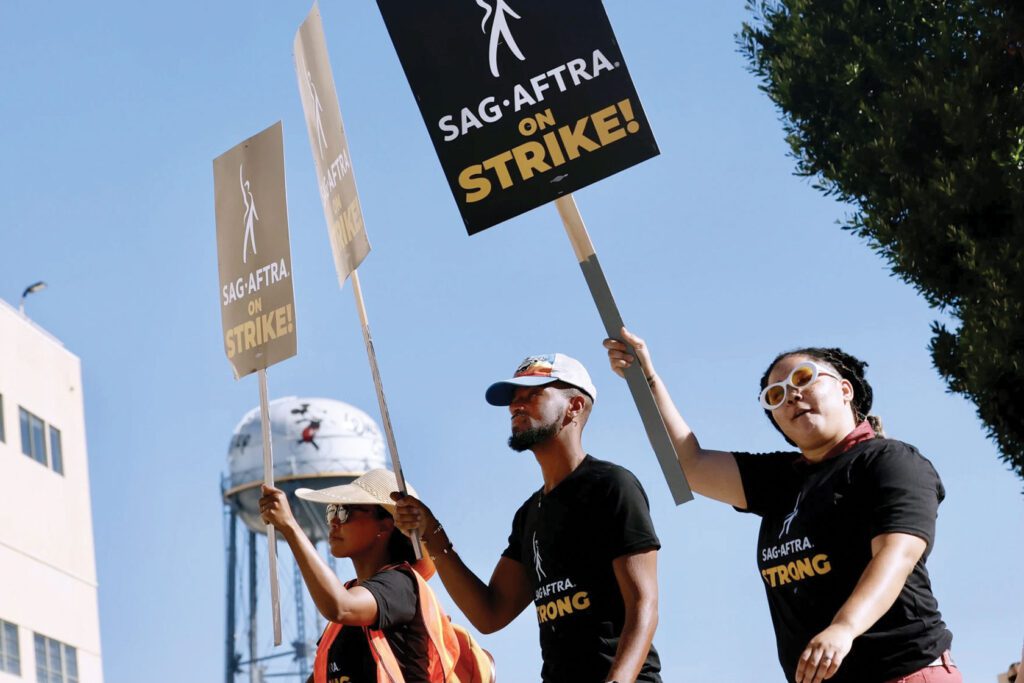Actors join writers in Hollywood strike
SAG-AFTRA members fight over higher pay, health care and AI use

The country’s largest actors’ union went on strike July 14 over an ongoing labor dispute with the Alliance of Motion Picture and Television Producers. The new work stoppage has coincided with a Writers Guild of America strike as part of broader Hollywood labor dispute.
SAG–AFTRA’s 160,000 members have joined the 11,000 Writers Guild of America members who have been on strike since May. The last time the industry has seen a labor walkout of this magnitude was 63 years ago, when John F. Kennedy was president.
Key issues for both unions include residual payments, which have been nearly wiped out by the switch to the streaming system, and the unpaid use of their work and likeness by artificial intelligence avatars.
Fran Drescher, SAG-AFTRA’s president, in a fiery speech pushed back on the notion that all actors are wealthy, saying that a vast majority “are just working people just trying to make a living, just trying to pay their rent, just trying to put food on the table and get their kids off to school.”
Drescher added, “Everything that you watch that you enjoy, that you’re entertained by, are scenes filled with people that are not making the big money.”
Recent data support her point. The federal Bureau of Labor Statistics reported the average pay for California actors in 2022 was $27.73 an hour.
Other data show that actors aren’t paid full-time year-round, due to the nature of the job.
According to Deadline.com, before the contract between actors and movie studios officially expired last week, SAG-AFTRA members had negotiated specific minimum rates for performers. An actor who worked on a television show for one week was paid a minimum of $3,756.
Kellee Stewart, an actress who has performed for more than 20 years and has appeared on the television series “All American” and “Black-ish,” noted that performers traditionally don’t get to take home the number that appears as their rate.
“You don’t get to keep it all when you get a paycheck,” she said. “You must pay taxes, plus commissions. For me, that would include an agent, a manager and a lawyer that negotiates your deals. Right away, when you’re giving a quote for what you’re going to get paid, you already know that’s really going to be 35% less, give or take.”
SAG-AFTRA is taking a hard stand on non-union members who participate in breaking the strike. Anyone who is a social media influencer and wants to take work promoting a film or TV series for a studio might want to think twice.
The union has issued rules during the strike for social media influencers. “Any non-member seeking future membership in SAG-AFTRA who performs covered work or services for a struck company during the strike will not be admitted into membership in SAG-AFTRA,” the union has warned.
The news of this ruling is creating headaches for major studio and streaming companies as they rely on TikTok-ers to create buzz for productions.
As for consumer viewing habits, Tony Marlow, Global CMO at LG Ad Solutions, predicts viewership will continue to shift towards non-scripted programming such as sports and reality-TV shows.
“We are two months away from the NFL season, which will appeal to viewers and advertisers,” he said.
As for the long-term, Marlow sees a massive gap in creating new content.
“Without deals signed with actors and writers, streamers won’t have new scripted content to bring eyeballs to their platforms,” he said. “They will have to purchase existing content that will be competitive to acquire.”
The consumer, Marlow adds, could feel this in the form of higher subscription rates.
Forbes magazine spoke with entertainment law attorney Camron Dowlatshahi, a partner at Los Angeles-based Mills Sadat Dowlat LLP, who addressed the issue of artificial intelligence, or AI.
“It’s difficult to get a grasp on how AI will be used in Hollywood, but even with all that uncertainty, neither SAG-AFTRA, the WGA, nor the AMPTP wants to make a deal that will set them back,” Dowlatshahi said. “Everyone has a clearer understanding of streaming and how that will develop now that the studios have each established their streaming platforms and are acquiring all types of content. Streaming has less room for growth than it seemed a few years ago, but the platforms are stable, and there’s no expectation that they’ll fail. It’s just a matter of deciding a fair share of residuals that SAG-AFTRA and WGA members should receive.”
It’s going to be a long hot summer in Hollywood, where the financial and human toll is already being felt. On the bright side, talk shows, variety shows, reality competition shows, game shows, some award shows and documentaries (unless they’re being released theatrically) are all still free to produce new episodes.
Tanya Hart hosts “Hollywood Live” and “Hollywood Live Extra” on American Urban Radio Networks.






